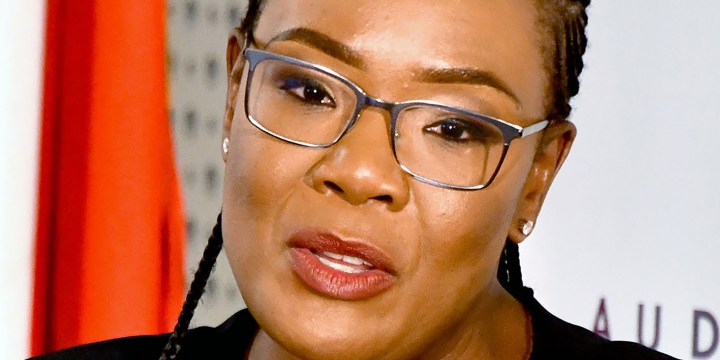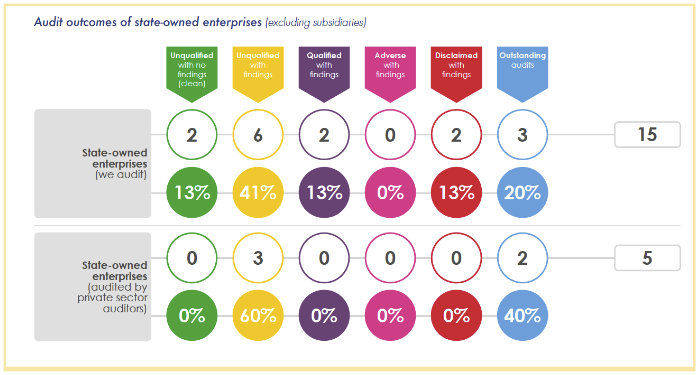AGE OF ACCOUNTABILITY
Government lost R12bn to non-compliance and fraud, latest Auditor-General report reveals

While there has been a slight increase in clean audits from the Auditor-General, the government lost R12bn related to non-compliance and fraud, and service delivery departments and state-owned enterprises falling short.
‘It’s urgent that everybody in the accountability ecosystem acts differently, sees things differently, sees them for what they are, and acts in a way that protects resources and guides public institutions towards a culture of better performance, of better integrity and enhanced transparency and accountability,” said Auditor-General Tsakani Maluleke as she released the 2021-22 general report and material irregularity report for national and provincial departments and their entities during a media briefing on Wednesday.
AG Tsakani Maluleke briefs members of the media on the 2021-22 PFMA audit outcomes #AGReport
Read the full report here:https://t.co/iGidKwiS9Y pic.twitter.com/inhO1I4Kb6
— Auditor-General SA (@AuditorGen_SA) November 23, 2022
The Auditor-General estimated the financial loss from material irregularities at R12-billion.
Most of the material irregularities “were caused by non-compliance and suspected fraud which resulted in, or are likely to result in, material financial loss,” according to the report.
Money was mostly lost in procurement processes that are “unfair, uncompetitive and uneconomical” and in payments for goods and services that weren’t received.
The report also found there was a lack of caution with regard to spending, with money being spent when there was little or no value received, as well as “the interest and penalties being paid as a result of late payments — including to [the SA Revenue Service].”
Slight upward trend in clean audits
The outcomes of PFMA (Public Finance Management Act) audits for 2022 and the material irregularities showed a gradual upward trend since Maluleke took office in 2020. For example, in this 2021-2022 report, 30% of the auditees had a clean audit, compared to 27.7% in 2020-2021 and 22.8% in 2019-2020.

Forty-four percent of auditees didn’t qualify for a clean audit, which means that with the 30% clean audits, 74% of auditees were able to report transparently on how they dealt with their financial resources.
However, the 30%, or 128 auditees (56 departments and 72 public entities) that achieved a clean audit only deal with 6% of the R2.8-trillion expenditure budget managed by SA’s national and provincial governments.
What is a clean audit?
“An auditee that’s got three areas with no audit findings gets what we call a clean audit,” said Maluleke. She explained that there are three areas the Auditor-General must audit, as stipulated by the Public Audit Act:
- Having credible financial information;
- Reliable and useful performance information; and
- Operating within the rule of law.
“Essentially, at its heart, a clean audit lends to somebody who’s got the ability to report transparently on what they’ve done with the money allocated to them; they’ve been able to confirm what it is they’ve done in relation to the performance objectives that were approved in relation to their institution, and again, that indicated an ability to operate within the rule of law,” said Maluleke.
Worst performers — service delivery and SOEs
“This improvement trend, however, doesn’t translate into the key service delivery departments,” acknowledged Maluleke.
“Those are the big departments with the big budgets. And they are the ones that have the closest proximity to citizens.”
In the key service delivery portfolios (basic education, health, human settlements, public works, transport, and water and sanitation), only 6% had clean audits. The only departments with clean audits were the Western Cape Department of Health, the Western Cape Department of Transport and the KZN Department of Human Settlements.
This year’s AG report found that the service delivery portfolio and state-owned enterprises “are responsible for more than 30% of the expenditure budget, but consistently have the worst audit outcomes”.

Out of the 15 state-owned entities in the AG audit, only two received a clean audit: the Development Bank of Southern Africa and the Land and Agricultural Development Bank of South Africa.
The private sector audits five state-owned enterprises, including Eskom, which had audits that were still outstanding.
Culture of inaction starting to shift
The general report said that the AG had been reporting on the same issues and irregularities for many years, but now, through the material irregularities process, was seeing a change in how accounting officers and authorities respond to what they flag.
Maluleke said that due to the work of the AG’s office and as a result of reporting the material irregularities, losses of at least R600-million had been avoided, more than R1-billion was in the process of recovery, and at least R14-million had come back into the fiscus.
“What’s also interesting is that when accounting officers actually respond, they respond not just to this specific transaction we flagged, but they then look at the whole system.
Visit Daily Maverick’s home page for more news, analysis and investigations
“And they start to assess where else that type of transaction may have occurred, where else that type of loss may have occurred,” said Maluleke, giving an example of how the Department of Public Works and Infrastructure investigated further problematic transactions after the AG flagged matters around monthly leases that are entered into privately.
“They didn’t chase the recovery of one transaction we flagged, but actually, they’ve gone ahead and dealt with a number of transactions that were problematic,” explained Maluleke.
“Be it direct overpayments in terms of the lease agreements that are there, but also in terms of renegotiating the very costly, unnecessarily costly, month-to-month leases. And as a result, money that was being lost is being put back into the fiscus, and then money that may have been lost is now being safeguarded.”
Appointing the right people
In her recommendations to build an “accountability ecosystem”, the AG said greater focus and more energy needed to be put toward the performance, planning and management practices in the government, and monitoring processes needed to be strengthened, starting with making sure information is credible.
Maluleke emphasised the importance of investing in the capability of institutions and officials.
“Starting with filling vacancies with the right type of officials, let’s appoint people who are capable of doing the work at hand, and then let’s give them space to do the work,” said Maluleke.
“And with that, let’s put in place that type of performance contracting that is consistent with what is expected. And then let’s monitor and hold people accountable.” DM



















 Become an Insider
Become an Insider
Respect to our AG! A report like this and yet CR is
swanning around and telling the Brits that it’s safe to invest here? Does one laugh or cry?
The ANC govt is bleeding out. Hopefully this process will carry on until 2024 and we will remove them from power and put a new coalition in place.
Perhaps the AG is able to estimate what percentage of annual GDP is lost due to extraction?